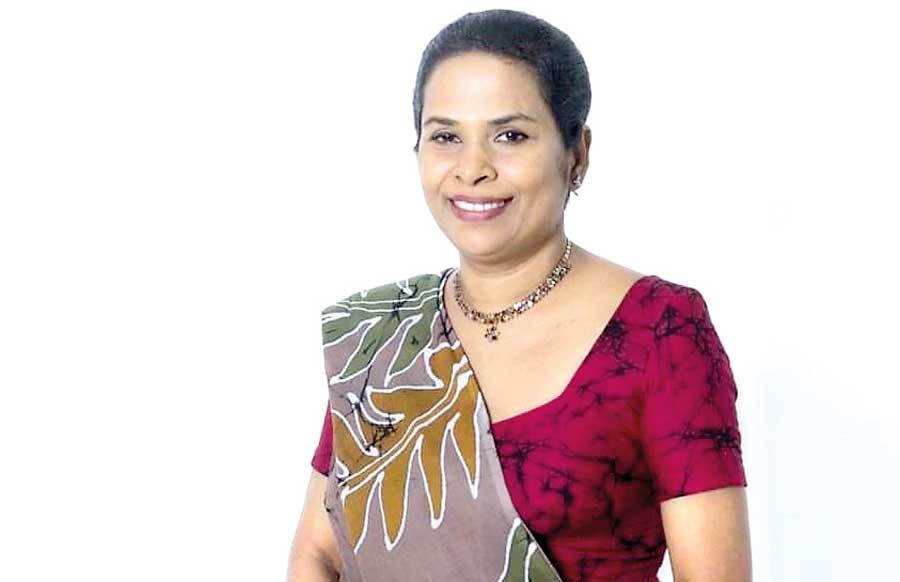Reply To:
Name - Reply Comment

Prof. Prasadini Gamage
A study by the Chartered Institute of Personal Management in Sri Lanka reveals that the lack of visionary leadership is the main reason for the country’s brain drain. The study surveyed over 3,600 professionals and found that 75% of respondents cited a lack of vision for the country’s future as a reason for their desire to migrate. Other top reasons for migration included poor salaries, lack of essential commodities, and lawlessness.
study surveyed over 3,600 professionals and found that 75% of respondents cited a lack of vision for the country’s future as a reason for their desire to migrate. Other top reasons for migration included poor salaries, lack of essential commodities, and lawlessness.
The Department of Immigration and Emigration recently said that around 900,000 passports were issued to Sri Lankans in 2022. The Bureau of Foreign Employment added that around 300,000 foreign job opportunities were provided to Sri Lankans.
This exodus of professionals, commonly known as brain drain, poses a huge threat to the country as well as its economy. In an attempt to identify the reasons for the migration of professionals, the research committee at the Chartered Institute of Personal Management, headed by Prof. Prasadini Gamage, Professor of Human Resources at the University of Kelaniya and several other researchers recently concluded a comprehensive research on the impact of brain drain.
In a candid interview with the Daily Mirror, Prof. Gamage explained the objectives of the study, it is findings and recommendations.
Excerpts:
 Q What is brain drain?
Q What is brain drain?
Brain drain is also known as labour mobility or skill migration. But it is not new to our country. Sri Lanka experienced a rigorous brain drain as a result of the pandemic followed by the economic crisis. No one has done a systematic survey to understand the reality of brain drain. Brain drain is where professionals including doctors, university academics, and bankers, leave their homeland and go to greener pastures to get better salaries, a good standard of living, and an education for children.
If we take a breakdown of professionals who have left the country, more than 700 doctors left the country last year out of nearly 20,000 doctors attached to local hospitals.
Around 125 of them are consultants. According to government sector information, out of 1,536 engineers attached to government organisations, around 436 engineers left the country last year. Recently, SriLankan Airlines, our national carrier announced that they require more than 300 pilots, but during the last six-month period around 80 of them have left the country.
The founder of a Private IT company recently announced on social media that a few hundred are looking for options to migrate and that his company is experiencing a negative impact.
Apart from searching for jobs, many Sri Lankans go to other countries on student visas. They will study for Masters’s and then obtain a work permit. Thereafter they can apply for permanent residency. The negative outcome of this is that they will never come back. Sometimes they might visit the country for a brief period just to check on their parents.
Q What is the cost of producing people in different professions?
To educate a doctor the people of the country spend around Rs. 5 million. To educate an engineer they spend around Rs. 2.1 million and around Rs. 1 million is spent to educate a management graduate. But ultimately they leave the country. Whenever they leave they take not only their brains but their wealth as foreign currency and there is no assurance that they will send money to Sri Lanka as foreign remittances because they take their families along with them.
Q Let’s talk about the objectives of the study.
One objective was to identify the reasons for migration to a developed country. The second objective was to find out reasons for them to remain in the country. Thirdly, we wanted to find out whether those who have left the country are happy and whether they have an idea to come back to Sri Lanka.
This is also known as reverse brain drain. The data was collected from January to May 2023, and we distributed a Google Form among many organisations, individuals, government bodies, Sri Lankan associations in other countries and so on. The entire sample included 3,611 respondents out of which 2,496 of them were from Sri Lanka, while 665 individuals from overseas participated.
As usual in this research also the majority of them (58%) were males. In addition, a majority of them belonged to the 26-35 and 36-45 age categories. More than 75 of them were married. 84% of them had their primary education from government schools.
Profession-wise they represented the HR profession, medical doctors, engineers, IT professionals, lawyers, accountants, bankers, supply chain professionals and most interestingly government sector employees as well. A majority also belonged to the middle management category.
We then provided them with a timeline and asked at what point they wanted to leave. 58% said they want to leave within 1-5 years and 35% said they want to go immediately while 7% said they want to go after five years. They put all their efforts to leave the country. There’s a demand for nurses, teachers and some other similar jobs, sometimes they change their professions and qualifications to leave the country.
Q What are the reasons for migration?
Before going to the reasons I will firstly provide some statistics. Most of them prefer to go to Australia, Canada, the UK, Japan, and New Zealand. We asked whether the economic crisis is a proximate reason for their migration. 67% responded in the affirmative.
They only had an intention to migrate but it sped up due to the crisis. Due to power cuts and shortages in fuel and gas, they thought there was no remedy for these issues. We also wanted to compare the intention to migrate and the profession. Among the bankers, engineers, accountants, government sector employees, lawyers, marketers, and university academics who have responded, nearly 50% said they wanted to migrate while another 50% said they wanted to remain.
But 70% of HR professionals, IT professionals and supply chain professionals said they want to leave. This is going to be a huge issue for IT firms in future as they have to develop strategies to meet the shortage. 70% of professionals at the middle management level are interested in migrating.
But the senior management level is not interested as they say it is not the age to migrate. They have reached the self-actualisation stage and age is another matter. Around 50% of individuals in the junior management level are interested to migrate. 80% of individuals in the 18-25 age category want to leave.
Our university students belong to this category. They believe that they don’t have a future in this country. 70% of respondents in the 26-35 category also want to leave, while 58% of individuals between ages 36-45 want to leave. But a majority of them who are 46 or above want to remain.
In terms of reasons, 75% of them said there is no visionary leadership in this country. This means there is no future for the people and children. The second reason is poor salaries. They don’t get a proper salary for their efforts and qualifications. People feel that they have been demoted due to the imposition of taxes.
There is a lack of essential commodities. On the other hand, there is no proper law and order.
Q What do they get when they migrate?
The most attractive things include high living standards, good education, availability of essential commodities and high living wages. When looking at their independent comments, they say that they don’t see a vision for the development of this country due to political interference.
The income is not enough to maintain minimum living conditions and this affects mental health.
Sri Lanka hadn’t had honest leaders. Some want to give a good education to their children overseas because they feel it is highly competitive in Sri Lanka.
One response read as follows: “We wouldn’t have planned to migrate if we weren’t robbed by the politicians.”
But when we asked why 43% wanted to remain in the country, they want to stay because they want to look after their parents. The second reason is that they love this country. They also don’t like to raise their children according to Western culture. Some are emotionally attached to the country and are working towards reversing skill migration. Some of them are confident that Sri Lanka will bounce back stronger than ever. Some are not willing to do odd jobs in foreign countries.
Q Are they happy?
We measured happiness using the Oxford Happiness Index questionnaire and made some changes according to the local context. We asked if they are satisfied with their lives and whether they are happy with their income, social interactions, government etc. Except for engaging in social activities and loneliness, they gave positive answers for other indicators. This shows that they are happy. But they feel lonelier than living in Sri Lanka.
Their average happiness is 82%. We measured their duration of tenure and happiness. Those who have spent between 1-2 years are less happy compared to those who have been living overseas for around 15 years. This is because during the first two years, they experience a culture shock, they have to find a job, find a good school for children etc. but eventually they adjust.
But we observed that they once again feel less happy after 15 years. This is because they feel that they miss something; their homeland. They miss their parents, relatives, and friends. This is similar to the diminishing marginal utility theory in economics.
Q Do they have an intention to return home?
72% said they would return to stay for a short period. Another 14% said they want to come back permanently. Another 22% said they will never come back. Around 38% said that if/when Sri Lanka becomes a prosperous country they would return.
Q How does this issue affect you as an academic?
Earlier we didn’t have this many issues. The tax reforms and inflation affected us adversely. I feel that I was given three demotions. We have to pay 36% of the income that we get. Therefore what we earn isn’t sufficient. But I never had an intention of migrating and I want to give something back to the people.
Q What are your recommendations?
Based on the country level, there are some concerns for people. If all people leave this country will become a desert. The government has to develop exports to generate foreign currency for the country. They send uneducated, unskilled poor ladies abroad as housemaids but once they return their families are destroyed.
They must have a clear-cut policy to generate income in terms of foreign currency. Then they can settle many issues such as developing infrastructure facilities, transport etc. New universities should be established. A majority of children fail their O/L examination.
There should be alternatives for these children. Otherwise, they hire a Trishaw and earn a living. Politicians should become very serious. The government has to revisit tax policies and bring about tax reforms. At an Organisation level, employers need to understand the skills of every employee. They need to pay individual attention to all employees.